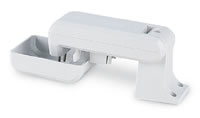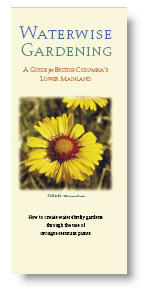
 |
More Ways to Conserve Water in the Garden
|
Tips for Water Conservation in the Garden
 Install a Rain Sensor, which will automatically disable your irrigation system when it's raining. Sometimes, it's the simple solutions that are the most effective! These now come in a wireless model, making their installation options much more varied.
Install a Rain Sensor, which will automatically disable your irrigation system when it's raining. Sometimes, it's the simple solutions that are the most effective! These now come in a wireless model, making their installation options much more varied.With educated irrigation practices, you can significantly reduce the amount of water it takes to keep your lawns and gardens vibrant and healthy through the hot summer months. Read on for details on watering restrictions, the Metro Vancouver's water conservation website, and Rain Bird's Intelligent Use of Water website.
Watering Restrictions Schedule
The Greater Vancouver Regional District reinforces this conservation through their watering restrictions schedule, which starts June 1st. These regulations keep the rate of water consumption evenly distributed throughout the summer in the GVRD, lowering the risk of reservoir levels being depleted too quickly.
Did you know ... Watering your lawn for one hour uses about as much water as...5 dishwasher loads, 5 loads of laundry AND 25 flushes of the toilet (1500 litres in total).
Do your part, and follow the schedule:
- Effective June 1 - September 30
Sprinkling allowed: 4AM - 9AM and 7PM - 10PM  Wednesday and Saturday: EVEN
numbered addresses
Wednesday and Saturday: EVEN
numbered addresses- Thursday and Sunday: ODD numbered addresses
Special permits are available that allow more frequent watering of newly planted lawns. Contact your local municipality for more information.
The watering of vegetable and flower gardens is not affected by these regulations. You may water your garden as often as needed, but please consider using a watering can or a hose with a spring-loaded shut-off nozzle to reduce water waste. Better yet, ask your University Sprinklers certified irrigation designer about gardenseparation and drip systems, and never water by hand again!
Metro Vancouver Water Conservation Web Site
For more great ideas on how you can conserve water as you irrigate, visit Metro Vancouver's Water Conservation Site, or read their Publication "WaterWise Gardening".
Rain Bird's Intelligent Use of Water
Rain Bird Irrigation Products, one of our top suppliers, is a leading innovator in the field of water conservation in the field of irrigation. Their website is an excellent resource, and lends great insight into the technologies we are embracing as a planet focused on conserving our resources. Be sure to visit their Intelligent Use of Water site. Be sure to visit Rain Bird's Intelligent Use of Water Film Competition website too, for some great videos on water conservation ideas! You can even enter a contest and win a trip to Los Angeles!

© Copyright
University Sprinkler Systems Inc.
University Sprinklers and www.universitysprinklers.com are registered trademarks of University Sprinkler Systems Inc.
Website Design by Rainmaker Marketing & Design. 604-739-9476
